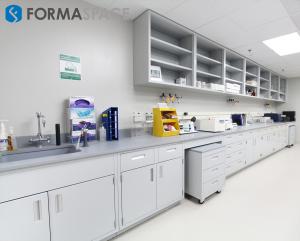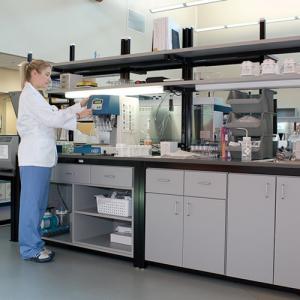Is Modular Laboratory Furniture Really More Expensive Than Fixed Casework?
After reviewing many fixed casework & modular laboratory furniture projects; this article compared pros and cons under 4 main subjects. Review them now!
Point 3: Cost is an issue. As it turns out, modular designs are often cheaper than fixed casework installations.
”
AUSTIN, TEXAS, UNITED STATES, July 25, 2016 /EINPresswire.com/ -- In the laboratory field, there is a major trend underway toward modular lab furniture, yet many assume that modular designs are more expensive than traditional fixed casework. We investigate the facts about modular versus fixed casework.— Formaspace
In this brief buyer’s guide, we uncover the many reasons that modular laboratory furniture is becoming more popular — such as modular furniture’s lower installation costs — which generally make it less expensive than fixed casework projects.
But before we jump into the side-by-side comparison, we want to be clear: Formaspace sells BOTH modular lab furniture AND fixed casework. We’ve got you covered either way.
In fact, we recently completed construction of the largest food and diagnostics lab in the U.S. at Fort Sam Houston in San Antonio, Texas for the Department of Defense’s Food Analysis and Diagnostic Laboratory (FADL).
So if your preference is for fixed casework, there’s no doubt about it — we have the solution you need.
But modular furniture is coming up fast, so we’d like to share with you what we’ve learned from over 30 years of experience in working with laboratories, and why the market is making the move to modular furniture designs.
Our research and experience shows there are four key points to consider when deciding between fixed casework and modular furniture.
Point 1: The lab you build or renovate today will evolve considerably during its useful life.
Constant change is the watchword in today’s modern life science and research laboratories. In particular, lab designers should pay attention to these three:
- changes in technology
- the hunt for scarce talent
- major real estate trends
First, a word about technology. It’s getting more sophisticated and powerful, often smaller, sometimes cheaper (but not always). At the same time, the continuous roll out of new technologies is leading many to reconfigure their lab facilities far sooner than they anticipated in order to keep pace with the latest scientific advances.
The big advantage for modular lab furniture is that it simplifies re-configuring your lab. With modular furniture you can move cabinets around — even change your entire floorplan — to improve traffic flow, accessibility, etc. Modular furniture also allows you to easily increase your storage density by adding more shelves and cabinets to your existing installation.
On the other hand, fixed casework makes it much more difficult to change anything about your lab layout. Even small alterations can result in complicated, time-consuming, and disruptive construction projects.
As the healthcare, life sciences, and research industries continue to grow, recruiting top talent has become another concern that lab designers and space planners need to take into account. As in other tech industries, the best and brightest graduates have new ideas about how they want to collaborate in the workplace, as exemplified by emergence of non-traditional
Real estate trends are another important consideration. In the established life science research clusters like Boston, Raleigh-Durham, New York / New Jersey, the Bay Area, Los Angeles, and San Diego, occupancy rates are very high, which has driven up commercial rents for lab space to new highs. At the same time, mergers and acquisitions are on the increase.
The upshot is that if your lab has a favorable lease (or you own your real estate), you may be facing increasing pressure to accommodate more people and equipment in your existing location due to the high cost of relocation or expansion. In this case, modular furniture solutions make it far easier to increase the efficiency of your current setup. It’s very straightforward to add new workspaces and additional storage components, which is difficult to achieve with traditional fixed casework.
CONCLUSION 1: To keep up with technology, talent, and real estate space planning trends, modular lab furniture has the advantage in flexibility because re-configuring your facility is much easier compared with traditional fixed casework designs.
Advantage: Modular
Point 2: Chances are increasing that your entire lab operation will need to move to a new location one day.
A report on trends in the life sciences market by the real estate consultancy Jones Lang LaSalle (JLL) confirms that overall growth, along with industry consolidation and globalization, is resulting in shortages of available high-quality lab space in the key life science clusters around the nation.
In the Cambridge / Boston area, which has the highest concentration of laboratory research activity in the U.S., the real estate consultancy CRBE reports that lease rates are at a record high and there is little inventory for expansion.
This phenomenon is replicating itself across the nation. As a result, many laboratory research companies in major cluster centers like Cambridge / Boston, the Research Triangle in North Carolina, San Francisco, and Los Angeles are now actively looking at:
- renovating non-traditional buildings to build out new laboratories
- relocating to suburban locations where rents are cheaper and space is available
- moving away from expensive cluster cities to secondary markets, such as Philadelphia
Read more... https://formaspace.com/articles/laboratory-furniture/modular-laboratory-furniture-vs-fixed-casework/?utm_source=einpresswire&utm_medium=content&utm_campaign=article-062016
Mehmet Atesoglu
Formaspace
8002511505
email us here
Legal Disclaimer:
EIN Presswire provides this news content "as is" without warranty of any kind. We do not accept any responsibility or liability for the accuracy, content, images, videos, licenses, completeness, legality, or reliability of the information contained in this article. If you have any complaints or copyright issues related to this article, kindly contact the author above.


